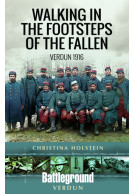Dervish (ePub)
The Rise and Fall of an African Empire
Imprint: Pen & Sword Military
File Size: 17.9 MB (.epub)
Pages: 235
ISBN: 9781473813519
Published: 14th April 2010
| Other formats available - Buy the Hardback and get the eBook for free! | Price |
|---|---|
| Dervish Hardback Add to Basket | £13.99 |
Dervish is the vivid and colourful story of one of the more remarkable episodes in the 'high Empire' period of British history. The Mahdi's rising in the Sudan in the 1880s starting as a localized Holy War against the 'decadent' Turkish/Egyptian overlords, engulfed a million square miles of arid territory and forced the British Liberal Government to get involved after the early disasters of the Hicks expedition and Gordon's death at Khartoum.
The narrative, which makes excellent use of the first-hand diaries and reports, including those of Rider Haggard's brother Andrew and of Father Ohrwalder (the Austrian missionary who spent ten years of captivity in the Mahdi's camp), brilliantly describes the growth and strength of the Mahdist movement and the extraordinary devotion and discipline of the Dervish troops. Facing such opponents with stoic endurance were the British, Egyptian and Sudanese Negro soldiers, and the resulting military engagements evoked amazing feats of courage and derring-do on both sides.
The Dervish Empire outlasted the Mahdi by thirteen years. It ended in the battle of Omdurman and Kitchener's reconquest of the Sudan, which was well supported by Reginald Wingate's military intelligence operations. It lasted a comparatively brief span of time, but it had been established at the expense not only of the neighbouring Abyssinians but also of the European white man, at a time when Britain was approaching the zenith of its imperial power.
Philip Warner is author of Passchendale and The Zeebrugge Raid and numerous other first rate histories. He wrote the biographies of Auchinleck and Horrocks. He was the military obituary writer of The Daily Telegraph for many years. In WW2 he was a POW of the Japanese for 1,000 days. He died in 2000.
As featured on.
Daly History Blog - James Daly
While by no means a definitive account of its subject, it is an entertaining single volume account, well worth the read. This reviewer can see why Pen & Sword chose to republish it.
African Armed Forces Journal, July 2010
Under orders from the Prime Minister, who wavered over the decision, several thousand British troops were sent to an extremely hot and uncomfortable desert country where, along with soldiers from other nations, they were to rescue the country from a fanatical Islamic jihadist sect notorious for their courage, fighting prowess and willingness, even desire, to give their lives for their cause in the belief that such a death would bring rewards in paradise. The British troops were angered at the poor state of their equipment, especially small arms, and the tardiness of any positive responses to their appeals to the government. However, they fought with extreme courage against a relentless foe. Praise was singled out by everyone for the cool bravery and selflessness of the explosive disposal teams who had considerable numbers of mines to deal with. No, we are not talking about Afghanistan or the Taliban in the 21st century. This was Sudan in the 1880s where the enemy were the Dervishes led by the Mahdi, who considered himself to be the natural successor to the prophet Mohammed and whose aim was the removal of the British and Egyptians from their territory coupled with the spread of Islam to embrace the Middle East and beyond.
Pennant Magazine
The author, Philip Warner, is no doubt well known to many FPS members as he was a lecturer in Military History at the RMA Sandhurst. Himself an ex-soldier and FEPOW, he has written many books on military history. It is, therefore, surprising and disappointing that this book is rather disjointed, trying to cover a wide range of history and giving as much information about the British and Egyptian armies as the eponymous Dervishes. Another criticism is that the book suffers from the absence of a map of the region, this exacerbated by the tale flitting about from town to town and region to region, embracing not only the Sudan and Egypt but also Abyssinia. Notwithstanding the foregoing, this is an interesting read full of colourful characters: Gladstone, Gordon, Kitchener, Wolseley, Churchill and many more. The intriguing parallels between the Sudan campaign and that of today in Afghanistan are constantly in focus. Sadly, it seems that few lessons have been learned in the almost 120 years which have elapsed between the two conflicts.
Philip Warner's Dervish: The Rise and Fall of an African Empire provides a sound introduction to this remarkable episode in British military history. Parallels with modern resurgent Islam spring to mind, even though the book originally appeared in 1978. A good story well told.
Soldier Magazine Sept 2010
About Philip Warner
Philip Warner (1914–2000) enlisted in the Royal Corps of Signals after graduating from St Catharine’s, Cambridge in 1939. He fought in Malaya and spent 1,100 days as ‘a guest of the Emperor’ in Changi, on the Railway of Death and in the mines of Japan, an experience he never discussed. A legendary figure to generations of cadets during his thirty years as a Senior Lecturer at the Royal Military Academy, Sandhurst, he will also be long remembered for his contribution to more than 2,000 obituaries of prominent army figures to The Daily Telegraph. In addition he wrote fifty-four books on all aspects of military history, ranging from castles and battlefields in Britain, to biographies of prominent military figures (such as Kitchener: The Man Behind The Legend, Field Marshal Earl Haig, Horrocks: The General Who Led From the Front (Pen & Sword, 2018) and Auchinleck: The Lonely Soldier (Pen & Sword, 2006) to major histories of the SAS, the Special Boat Services, Phantom and the Royal Corps of Signals.




















